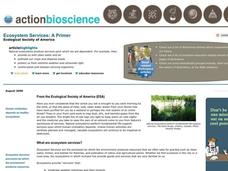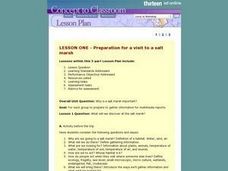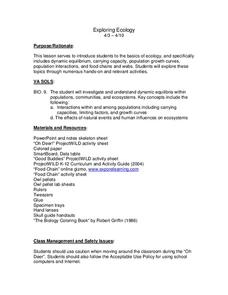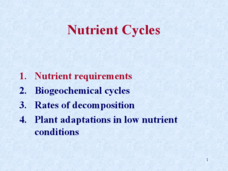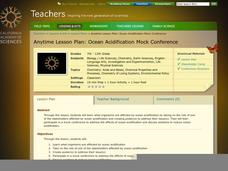Curated OER
Forest Succession
Students research environmental change and why forests cannot stay the same for long. In this environmental growth lesson, students discuss the life cycle of a tree and examine tree cookies to discover the age of these specimens....
Curated OER
Population Growth
Students grow duckweed, observe what happens when an organism population is allowed to grow without predation or competition, view videos about invasive species, and develop a proposal for controlling the growth of an invasive species in...
Curated OER
The Gulf of Maine
Young scholars examine the effect of limiting factors, especially when it comes to human beings. They examine data from the Gulf of Maine area.
Curated OER
How Much Is an Ecosystem Worth?
Students examine the value of ecosystems. They read and analyze an article, evaluate ecosystem services, research the benefits of biomonitors, and design a public service announcement.
Curated OER
Performance Art and The Waste Stream
Learners research local waste management services, discuss findings, give opinions about what they have found, offer solutions and ideas, and create performance art, design art works, and fine art works to convey information on waste...
Curated OER
Scavenger Hunt
Students explore area around schoolyard by participating in scavenger hunt, examine things that live there, such as noxious weeds, develop observation skills by using five senses, and find and identify ten to fifteen local, natural objects.
Curated OER
Investigative Case: The Nancy Creek Challenge
Students examine a case study of fish kill in Nancy Creek and identify the environmental conditions that favor life in a fresh water ecosystem. They work in small groups to assess the situation and gather resources from various places in...
Curated OER
Why is a salt marsh important?
Students discuss the salt marsh. They define the following terms: habitat, water, land and air. Students work in small groups. They are asked why are they going to a salt marsh? Students discuss whose habitat is it at the salt marsh.
Curated OER
Creating a Food Web
Students investigate hunters and prey by creating a food web. For this animal life lesson, students investigate a single organism in preparation for a field trip, discovering its diet and habitat. Students each discuss their animal...
Curated OER
Field Trip to the Watsonville Wetlands
Learners explore the differences between food webs and food chains. In this wetland lesson students play a food web game and go on a scavenger hunt.
Curated OER
Marine Protected Areas
Learners role play different stakeholders perspective on the debate about Channel Islands. In this marine science lesson plan, students identify different types of Marine Protected Areas. They research about their stakeholder's point of...
Curated OER
Ecology Explorers: Historical Air Photo Interpretation
Students identify and analyze land use changes over time with historic aerial photographs, and classify different land use into categories.
Curated OER
Lesson: Living With the Farm Next Door
Discuss with learners why farms are growing in size and why there is sometimes conflict between farmers and their non-farming neighbors. Read the article, "Living With the Farm Next Door," and then craft letters to the editor from the...
Curated OER
Six Levels of Ecological Organization
Ninth graders describe the six levels of ecological organizations and give examples of each. They also differentiate between food chains and webs and identify trophic and consumer levels in food chain and food webs.
Curated OER
ECOLOGICAL BIOASSAY OF COPPER SULFATE IN DAPHNIA MAGNA
Students use this lab as a follow up to the introduction of the ecosystems and productivity levels, bioassays and what and how they measure, and Daphnia magna as an index organism, i.e., a species whose health within an ecosystem...
Curated OER
Exploring Ecology
Young scholars explore the basics of ecology through numerous hands-on and relevant activities. They participate in an online food chain demonstration, which explores food web dynamics. They dissect owl pellets, examine the prey's...
Forest Foundation
Forests, Carbon & Our Climate
To conclude their examination of forest ecosystems, class members consider the role forests play in the carbon cycle and how forests can offset climate change.
Environmental Protection Agency (EPA)
The Case of the Mysterious Renters
Upper-elementary kids examine the water usage in their own home, then use that data to solve a case in which a landlady is trying to determine how many people are living in an apartment being rented. Combine math, scientific method, and...
Curated OER
Turning the Tide on Trash: Marine Debris Curriculum
Seven pages of fascinating reading on marine debris preface the activities in this lesson plan. Four different activities are employed to simulate how the debris is distributed in the ocean and along beaches. Early ecology learners...
Curated OER
Regents High School Examination: Living Environment 2007
Environmental science enthusiasts show what they know at the end of the year by taking this full-fledged final exam. They answer multiple choice, graph interpretation, and essay analysys questions, 73 of them in all. Topics range from...
Curated OER
Regents High School Examination: Living Environment 2005
The 2005 version of the Regents High School Examination in the area of ecology is as comprehensive as previous years' exams. It consists of 40 multiple choice questions on everything from the structure of DNA to the interactions within...
Curated OER
Nutrient Cycling
AP environmental science or college-level ecology classes will glean a tremendous amount of information on nutrient cycles from this detailed PowerPoint. It covers nutrient requirements, biogeochemcial cycles, decomposition rates, and...
California Academy of Science
Ocean Acidification Mock Conference
In a comprehensive role playing activity, teens play the parts of different stakeholders in the realm of acidic oceans. They research, debate, and create a presentation from the perspective of either ocean organisms, the fishing...
Scholastic
Study Jams! Population Growth
Along came a spider, who sat down beside her. She screamed, but RJ wouldn't smash it because spiders are a limiting factor for other insects in an ecosystem. In this video, other common limiting factors for populations are listed....
Other popular searches
- Population Ecology
- Animal Ecology
- Human Ecology
- Behavioral Ecology
- Ecology Principles
- Community Ecology
- Pond Ecology
- Ecology Organizations
- Global Ecology
- Ecology Ethics
- Ecology Food Webs
- Ecology and Plants





